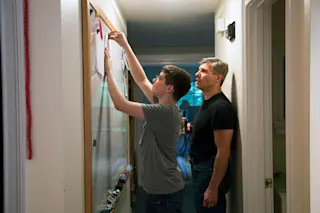For 14 years, ever since his son was an infant, Edward Damiano has worriedly checked on David as he slept. David has Type 1 diabetes and cannot regulate his blood sugar. His pancreas fails to produce and release two hormones: insulin, which lowers glucose levels in blood, and glucagon, which pushes glucose back up again. Despite insulin injections and regular monitoring, diabetics are whipsawed between extremes: High blood sugar degrades their organs over the years, while low blood sugar at any time can be fatal. Damiano feared that David could die of severe hypoglycemia in his sleep, what parents of diabetic children sometimes call “dead in bed syndrome.”
An associate professor of biomedical engineering, Damiano was in a position to help his son. “Years ago,” he says, “I started thinking about a two-hormone system that would make automatic therapeutic decisions.”
In June, Damiano’s team of doctors and engineers at Boston ...















